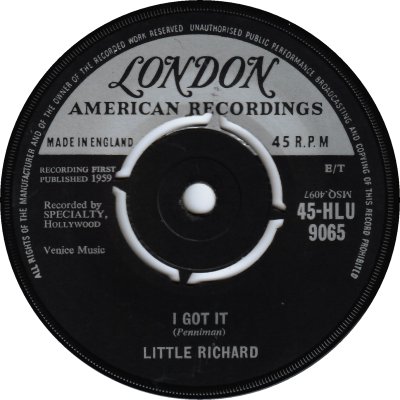
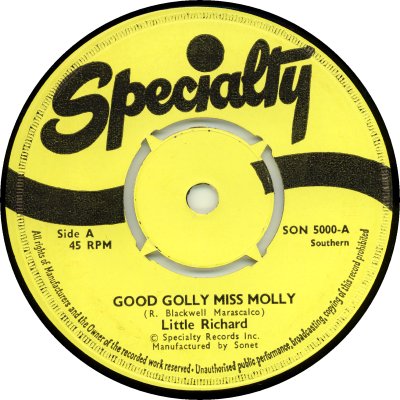
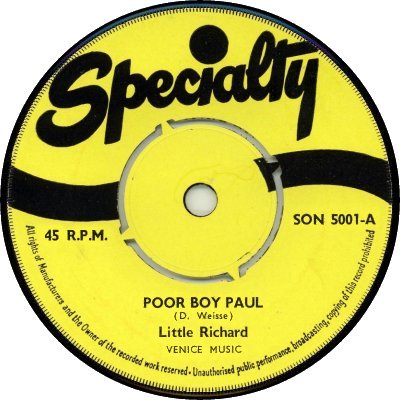
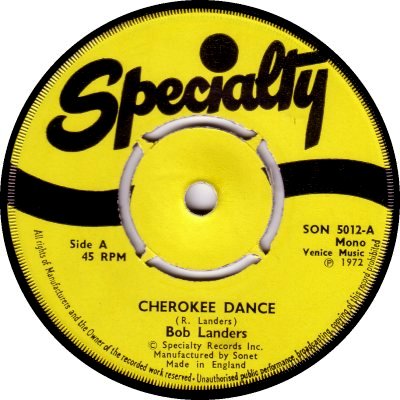
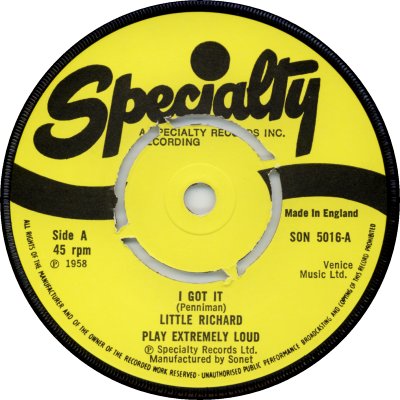
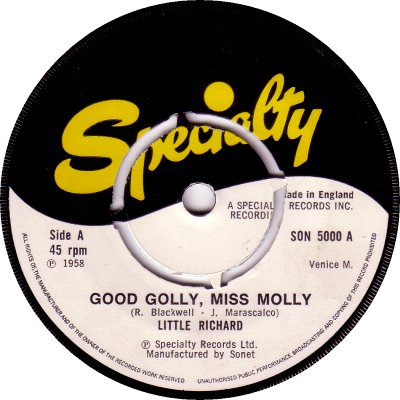
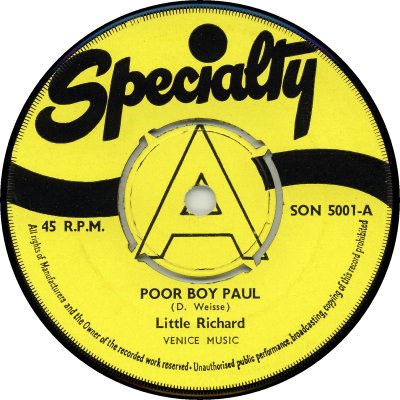
American, owned by Art Rupe; initially it was based in Los Angeles, later in Hollywood. 'Billboard' of the 10th of August 1946 reported that Rupe was to start a new label, Specialty, after selling his entire interest in his previous company, Juke Box Records, to Al Middleman - he had been in partnership with Middleman and his Sterling Records company. Rupe had retained the rights to a batch of masters and intended to release them on Specialty. Specialty was duly launched, and it concentrated on R&B and Spiritual records at first. It showed signs of ambition, joining with fellow independents Mercury and Aladdin to set up a series of distribution points ('BB', 15th January 1947); by the spring of 1949 it had its own pressing plant and had acquired a couple of publishing firms, Greenwich Music and Venice Music ('BB', 23rd April). The same issue of 'BB' also revealed that Specialty was moving to Hollywood. The following year 'BB' of the 1st of July 1950 broke the news that Specialty intended to enter the 45rpm market 'within the next ninety days', releasing new records on 45 and 78 simultaneously and reissuing back-catalogue hits on the new medium as appropriate. 'BB' of the 25th of November said that a further venture, into the LP market, was on the cards; it had only been delayed because of the success of two Specialty singles, Joe Liggins's 'Pink Champagne' and 'Please Send Me Someone To Love' by Percy Mayfield, which were keeping its presses busy. In the event the first advert for Specialty 45s didn't appear in 'BB' until the 24th of February 1951, which suggests that there was a delay for some reason. One final development in 1950 consisted of the company's taking a step into Europe, by way of a distribution agreement with a Belgian company which had been interested in Specialty's R&B sides.
1952 found Specialty dipping its toe into the Country market. 'BB' of the 28th of June described the move as 'long projected', and added that an initial release of three singles would be followed by four per month. Its basic interests were not forgotten, however. 'BB' of the 4th of April 1953 was able to reveal that Rupe had bought John Vincent's Mississippi-based R&B label Champion - Vincent was to join Specialty and head-up a new office in Jackson, Mississippi. 'BB' of the 24th of April 1954 observed that Specialty had been a pioneer in the Spiritual field and that it had one of the most important Spiritual / Gospel catalogues, accounting for 15% of the company's gross volume. 'BB' of the 4th of February 1956 had to report a decline in the sales of Spiritual records over-all, but fortunately for Specialty there was good news around the corner. It came in the form of Rock 'n' Roll, and in particular Little Richard, whose Specialty recordings such as 'Tutti Frutti', 'Long Tall Sally' and 'Rip It Up' sold all over the world (mainly via a licensing agreement with Decca) and went on to be acknowledged as classics of the genre. 'BB' of the 27th of April 1957 credited an upturn in the company's sales to a string of Little Richard hits. Later that year Larry Williams provided two more classics, 'Short Fat Fannie' and 'Bony Moronie'.
'BB' of the 19th of August 1957 told its readers that Specialty was embarking on a 'mammoth' album campaign including a couple of stereo lines; the following week's issue added a new Jazz line. These new activities seem to have led to a lull in the Spiritual field, but the market for them remained; 'BB' of the 8th of December 1958 revealed that the company had resumed regular releases of Spiritual and Gospel recordings 'by popular demand'. All was not well, unfortunately, and the final Specialty single of this first incarnation came out in September 1960. The label was shelved rather than abandoned completely; in 1964 Rupe put out a couple of singles by old Specialty acts Don & Dewey and Little Richard. Then in 1969 there came something of a revival, under general manager Mike Akopoff. 'BB' of the 6th of September broke the news that the company was back in business and that it intended to put out hitherto unreleased titles by Little Richard, Larry Williams and Sam Cooke. New sides were recorded and released; 'BB' of the 22nd of May 1971 carried an advert saying that Specialty was looking for new artists and new writers, while the following year 'BB' of the 29th of January 1972 commented that the company intended to re-enter the Gospel field, where it had once been a leader. Sadly none of this came to very much, and the final Specialty single of this second era came out that same year. All was not entirely lost: as 'BB' of the 18th of December 1972 observed, following an earlier licensing deal Specialty had formed a London-based company with Swedish firm Sonet that would continue to make Specialty product available in Europe. There was a steady trickle of reissues in the USA from 1983, exploiting the company's back catalogue, but Specialty was sold to Fantasy Records in 1990.
As far as Britain is concerned, a selection of Specialty records were licensed to Decca from 1956 to 1963 and came out on the London label with an originating credit to Specialty (1). The artists involved were Little Richard, Larry Williams, Sam Cooke and Gospel singer Alex Bradford. Little Richard was hugely successful here, and provided London with thirteen hits, five of them in the Top 5. 'Baby Face' b/w 'I'll Never Let You Go' (HLU-8770; 12/58) was the most successful of them, falling one place short of the top spot. Williams scored twice from six attempts, while Cooke's only London / Specialty release failed to tickle the Charts. The Bradford record, from 1963, was an EP of old material. The two singles from the 1964 revival were also issued here on London, the Little Richard one, Bama-Lama-Bama-Loo' b/w 'Annie Is Back' (HL-9896; 5/64), nudging the Top 20.
Specialty eventually made its debut as a label in its own right here towards the end of the 1960s, when Swedish firm Sonet signed a licensing deal which entitled it to issue Specialty product in Britain - it had held the rights in Sweden since 1964. The first mention in 'Record Retailer' of a UK Specialty release came in the issue of the 8th of November 1969, which said that Sonet had issued Little Richard's 'All Time Hits' album and a single from it, 'Good Golly Miss Molly' b/w 'Rock And Roll Is Here To Stay' (SON-5000). A second Little Richard single, 'Poor Boy Paul' b/w 'Wanderin'' (SON-5001; 1970) followed. During that period Sonet records were handled by Transatlantic (q.v.); in addition to its own efforts Transatlantic called upon Selecta and Lugton to help with distribution in the first few months of the decade - EMI replaced them from the 1st of September 1970. The first issue of SON-5000 was pressed by CBS (2); 5001 however was definitely pressed by EMI: it had an EMI-style matrix number in the run-off and perforated copies had the narrow perforations distinctive to EMI at that time (3). In April 1972 Sonet moved from Transatlantic to Pye for manufacture, marketing and distribution, taking the Specialty label with it. Later that year Sonet and Specialty joined together to form their London-based company.
Following the move to Pye the first two singles were mentioned in the 'New Singles' leaflet for the issue of the 7th of July 1972; they appear to have been re-pressed and reissued at that point. The next releases took a while to appear. 'Music Week' of the 7th of October reported that Sonet was planning a 'Golden Oldies' series, which would retail at 50p and would feature material by Little Richard, Lloyd Price and Sam Cooke, but nothing happened for six months or so. Then on the 17th of March 1973 'MW' announced that the company was putting out eleven Rock 'n' Roll / R&B singles on Specialty that week, including ones by those artists. According to the article Jerry Byrne's 'Lights Out' b/w 'Honey Baby' (SON-5011) would be getting its first UK release in single form - the same applied to many of the other tracks, which also were highly rated by enthusiasts for the genre. Only ten singles, SONs 5002 to 5011, were listed on the 'MW' 'Releases' page for that week, but SONs 5000 to 5012 featured in a Pye advertisement a couple of months or so later. During the next twelve months SONs 5013 to 5015 were issued.
These first sixteen singles all had the yellow-and-black label design, but there were variations in the positioning of some of the credits. The first pressings of 5002 to 5012 have the third type shown above, with copyright credits to Specialty and Sonet at the bottom along with the country of manufacture (4). SON-5016, which was undated, bore the fourt type of label, which had 'A Specialty Records Inc. Recording' under the logo; it also had 'Made in England' at three o'clock, and the artists' names were in capitals. In addition the copyright reference at the bottom had been changed to a publishing one (5). Some earlier singles can also be found with this label as well: I've seen 5003, 5011, 5013 and 5015 with it. Presumably these were re-pressed at around the same time that 5016 came out. There were a couple of minor variants as well. In 1976 the yellow label was replaced by a black-and-white one that resembled more closely the American original (6). The final two singles, SONs 5017 and 5018, seem to have had only this kind of label, as did the EP, SONE-1. Many other records in the series can be found with it: presumably they, too, are re-pressings, and they were done in or after 1976 - the black-and-white copy of SON-5012 has '1978' on it. There may well have been an effort to market them as a batch, but if there was 'Music Week' didn't mention it. As a result of all this activity at least two singles, SONs 5011 and 5015, can be found with all three kinds of label.
As far as I know only one Specialty single appeared in promo form: some copies of the first (EMI) pressing of Little Richard's 'Poor Boy Paul' can be found with a hollow 'A' on them (7). A similar marking was used by Transatlantic for promos on its 'Big T' label during the last quarter of 1970 and the first quarter of 1971 (approximately), which suggests that 'Poor Boy Paul' was first issued during that period. The American single came out in November 1970, so a UK release around that time sounds reasonable. Singles came in plain white sleeves; there were no Specialty company sleeves in the UK. The dates given in the discography below refer to when the singles were first released - as stated above, many singles were re-pressed and re-promoted several times.
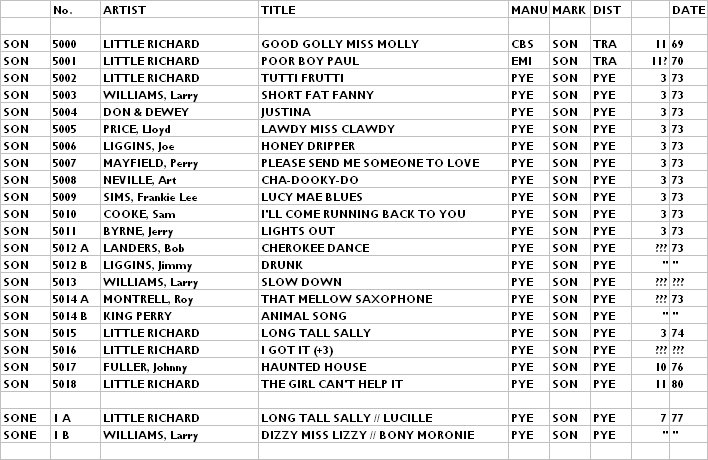


Copyright 2006 Robert Lyons.

